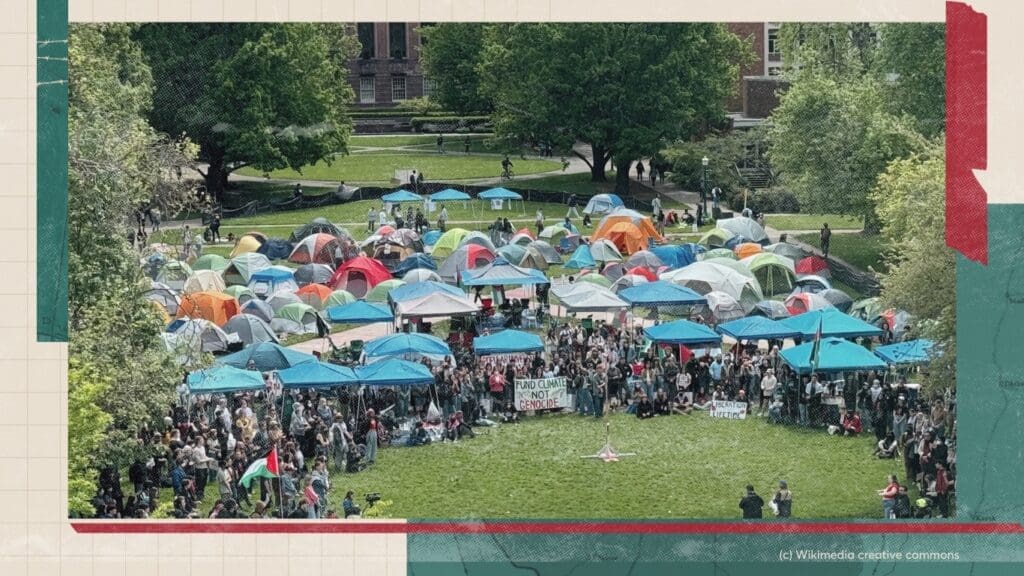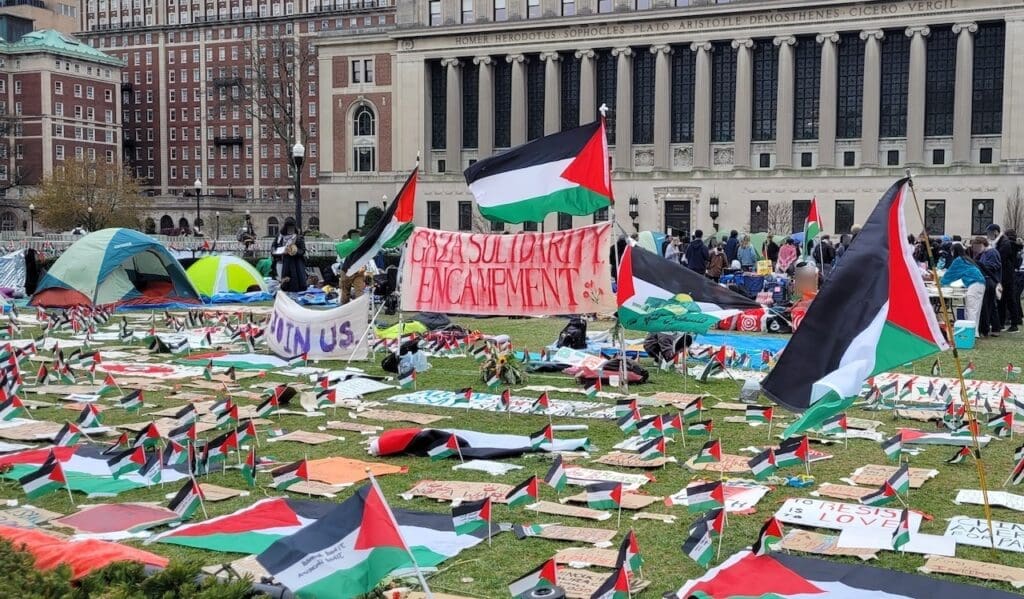- Topics
-
Topics
See our analysis on civil society and how it shapes culture, politics, and policies
Read our insights on the shifting political landscape and what it means for Palestine
Learn more about the policies and practices shaping the Palestinian economy
Strengthen your understanding of the unique conditions for Palestinian refugees across the Middle East
-
- Analysis
-
Analysis
In-depth analysis on existing or potential policies that impact possibilities for Palestinian liberation.
Insights and perspectives on social, political, and economic questions related to Palestine and Palestinians globally.
Concise analysis into a specific policy, its background and implications.
Commentary that brings together insights from multiple analysts.
Compilations of past Al-Shabaka works surrounding a specific theme.
Longer-form, ad hoc projects that seek to confront research questions outside the scope of our regular analysis.
A policy-driven research initiative by Al-Shabaka: The Palestinian Policy Network.
Our monthly webinar series that brings together Palestinian experts.
Featured
In this commentary, Samer Alatout offers key insights into this new wave of student mobilization. He details student demands and places them within the historical legacy of US student organizing. He also examines the relationship between university administrators, students, and faculty, and finds hope in the kinship emerging between the latter two groups at this critical moment. Samer Alatout· Jul 14, 2024In this policy lab, Nour Joudah and Kylie Broderick join host Tariq Kenney-Shawa to discuss some of the key lessons to be gleaned from the encampments and how we can best build on them to strengthen the Palestine solidarity movement moving forward.
Samer Alatout· Jul 14, 2024In this policy lab, Nour Joudah and Kylie Broderick join host Tariq Kenney-Shawa to discuss some of the key lessons to be gleaned from the encampments and how we can best build on them to strengthen the Palestine solidarity movement moving forward.
 On May 17, 2024, the US began operating a temporary floating pier off the coast of Gaza. Since the project’s announcement, many have expressed skepticism towards the pier’s effectiveness and deep concern regarding the US’s long-term plans and the pier’s potential role in serving Israeli objectives. This commentary examines the pier’s operations and unpacks the many incentives for its development by key geopolitical players. It positions the pier within Israel’s longer-term strategy for Palestine, using the structure as a window into understanding the regime’s broader regional aims. Temporary or not, this commentary contends that the pier must not be viewed as merely a short-term humanitarian effort, but also as a symbol of the US and Israel’s continued imperial and colonial endeavors.
On May 17, 2024, the US began operating a temporary floating pier off the coast of Gaza. Since the project’s announcement, many have expressed skepticism towards the pier’s effectiveness and deep concern regarding the US’s long-term plans and the pier’s potential role in serving Israeli objectives. This commentary examines the pier’s operations and unpacks the many incentives for its development by key geopolitical players. It positions the pier within Israel’s longer-term strategy for Palestine, using the structure as a window into understanding the regime’s broader regional aims. Temporary or not, this commentary contends that the pier must not be viewed as merely a short-term humanitarian effort, but also as a symbol of the US and Israel’s continued imperial and colonial endeavors.

-
- Resources
- Media & Outreach
- The Network




NGOs vs. Grassroots Movements: A False Dichotomy
It seems to be popular these days to persistently juxtapose what is assumed to be politically “correct” mass and popular movements against politically “incorrect” non-governmental organizations (NGOs) and professional institutions that do not necessarily have a popular base.1 Recent writings include V. Suresh’s Funds and Civil Liberties (see also this writer’s response), and in the Palestinian and Arab context, Tariq Dana’s thought provoking article “Palestinian Civil Society: What Went Wrong?” Islah Jad’s equally thought-provoking ”The NGO-isation of Arab Women’s Movements” is an earlier example of this trend.
These writings raise important questions, but make assumptions and assertions that deserve further inquiry and debate. The authors note that because of NGO dependence on donors, their agendas and political outlook are necessarily affected and even subjugated, and their links to the community are weakened. They propose that civil society should move away from “NGO-isation” towards some idealized form of mobilized grassroots movement committed to a national liberation agenda and, in Palestine, the politics of resistance.
The juxtaposition of the “grassroots” and the “NGOs,” however, is a false and unnecessary dichotomy. There have certainly been a host of issues associated with foreign funding of local efforts, including the matching of donor and national priorities, the “black lists” established by the United States, growing dependency and many others. But there are also problems associated with grassroots movements as well, particularly in the fragmented political environment that currently exists.
In such an aid-dependent and politically volatile society as Palestine, these concerns take on heightened importance and need to be discussed and debated. Rather than pose either/or propositions, it is important to adopt a more inclusive attitude that recognizes the diversity of approaches as enriching the creative and mutually supportive components of civil society. It is the very multiplicity and variety of Palestinian civil society that is perhaps the only glimmer of hope in this grim political environment.
How Popular Are People’s Movements?
One of the issues regularly raised is the great increase in aid money after 1993, and the Oslo-driven shift from grass roots movements “deeply-rooted in the national liberation movement” as Dana says, to NGOs as intermediaries between the global and the local. This is debatable. NGOs were already active before Oslo. Indeed a great many of the development, human rights and women’s rights NGOs were established in the early 1980s and 1990s. These organizations were already doing very good work long before the post-Oslo increase in funding.
The “popular committee” phenomenon of the 1970s and 1980s such as the volunteer committees initiated by Birzeit University, the Medical Relief and Agricultural Relief committees and others also did excellent work and helped to prepare the ground for the first popular Intifada. Political actors, especially the Communist Party, initiated many of those committees, but eventually Fateh and others established rival committees as well. Despite the good work they did, they were not free from accusations of political elitism and manipulation of nationalist sentiment for purposes of partisan political party mobilization. The success of those mobilization efforts can be questioned, as evidenced by the weak state of those movements today. The reasons for that weakness must be studied in the context of their own history and modes of operation, rather than simply be blamed on the proliferation of better-funded NGOs.
Another over-simplified juxtaposition is pitting the presumed donor-driven globalized agendas of NGOs against the (again presumed) more homegrown national agenda of popular social movements. Funding can of course affect NGO agendas since donors do come with their own agendas and priorities. But the argument that these NGOs become implementers of foreign agendas, and that this happens at the expense of other, more indigenous forms of civil society formation, requires more evidence; a cause-and-effect connection is not so easy to discern. The fact that dozens of people choose to go after the money by forming NGOs does not mean that every NGO does so, nor does it explain why thousands others have not joined or have abandoned “mass movements.”
The picture is more nuanced and complicated, and our understanding of it must begin with questioning whether the idealized “mass-based” movements were indeed “mass-based” and represented a popular national agenda rather than that of the competing political actors behind them, as mentioned earlier. Given the current political fragmentation of Palestinian society, do we have a unitary or coherent “national agenda” beyond liberation from occupation? Moreover, don’t Fateh, Hamas, the Left in general, and even the “new globalized elite” have different visions of Palestinian society, and shouldn’t they be able to articulate those visions equally and offer the general public competing agendas and pathways to achieve them?
Donor Agendas and Other Criticism
Donors often focus their funding priorities for their own reasons, some of which are strategic, some programmatic, and some even political, and this does affect what issues get funded in any given year. No doubt, NGOs must research donor organizations’ priorities before submitting their proposals and make decisions accordingly. Sadly, not all NGOs are able to negotiate with their donors to gain support for what they feel are priority issues. It is because of this problem that a number of regional activists – including this writer — established the Arab Human Rights Fund, which takes its funding cues from the concerns on the ground and also seeks to educate international donors.
But to say that donors’ priorities eroded the capacity of Palestinian NGOs to produce plans based on national priorities – assuming we have the same national priorities – is unfair and sidelines the commitment and hard work of Palestinian NGOs. To give only one example, how is it a foreign agenda for the Palestinian Center for Human Rights in Gaza and al-Haq in Ramallah to use foreign funding to file war crimes cases against Israeli officials in Europe? Even though cowardly diplomats and courts in Britain and elsewhere are changing their laws to avoid having to deal with war crime cases, Israeli officials periodically cancel travel for fear of prosecution because of Palestinian NGOs’ creative and courageous efforts in that regard.
In fact, the power of donors to actively impose their own priorities or views on NGO work is more limited than is often assumed. For donor organizations, it’s damned if you do and damned if you don’t, as Rachel Wahl notes. If donors are lax about the lack of institutional accountability, they are blamed for supporting inefficiency, undemocratic NGO structures and elitism. Yet if they become too insistent or “pushy,” they are accused of interfering in the work of national NGOs and imposing their agenda. Our attention should be focused instead on Palestinian organizations’ own responsibility to be accountable and operate effectively and efficiently and be clear and insistent on their own agenda.
Then there’s the criticism that NGOs have hierarchal structures where power is concentrated in the hands of a few individuals who are only accountable to their Boards (if Boards do indeed exist or operate as they should) and not to their community. This is not a new phenomenon in Palestine or in the region for that matter, and it is not limited to the NGOs. Civil societies almost always reproduce the leadership models they are accustomed to, and Palestine is no exception. It is not only the director of many an NGO who has been in their post for 30 years, but also the head of state or a local committee or council, political party, and workers’ organization among others. To see this as a problem unique to NGOs is misplaced.
Dana makes the argument that a FAFO poll found that 59% of respondents distrusted Palestinian NGOs. This is misleading if not seen in context. That same poll showed a general lack of trust in everyone, including the political leadership. Trust in Mahmoud Abbas stood at the same 41% in 2011 and was even less for Ismail Haniyyeh at 24% in that same year. Palestinian trust in the democratization process was a dismal 25% (interestingly, their trust in human rights was nearly double at 45%). Palestinian trust in their NGOs (41%) is consistent with those numbers. In other words, Palestinians deeply frustrated with the status quo and the lack of progress on many fronts have been losing trust in everyone, not only NGOs.
Aid and Political Activism
Certainly the aid on which Palestine has become dependent is a harsh reality and the consequences this has had on the discourse and direction of development deserve much evidence-based research. However, we need to dig deeper into whether or not the de-politicization of specific funded projects necessarily leads to the de-politicization of the NGOs or of Palestinian society as a whole, as has been claimed, or whether the international development discourse perforce de-legitimizes what should be Palestinian-specific discourse and priorities.
Human rights organizations have come in for much of that criticism, but the evidence is to the contrary. This is precisely because their starting point is the universality and international standards of rights and the moral and legal power to claim them against the Israeli occupation, the Palestinian Authority and Hamas. Should women’s claims for equality be subordinated to the national struggle for liberation (the usual “not now, we have to fight the occupation”), or will women’s rights organizations be accused of “de-politicization” if they undertake a project – funded by an international donor – to bring Palestinian practices in line with international standards for women’s rights?
Even if some NGOs do become de-politicized – and this is not necessarily a bad thing – this does not mean that the entire society is. The work and sacrifices of the Palestinian-inspired International Solidarity Movement, or the organizations documenting settlements and settler violations or house demolitions and the effects of the Apartheid Wall, all funded by international donors, attest otherwise.
It is sometimes asserted that knowledge production has also shifted towards a neoliberal or neocolonial “taming” of Palestinian society into accepting the peace process, and that we need to reinvigorate “anti-colonial” and liberating research. Knowledge is crucial, and the more that can be produced to inform policies and construct liberation approaches and methodologies of resistance the better. But we do need to be careful of our value judgments. Knowledge must be based on truth and on credible analysis, whether that analysis is based in colonial, anti-colonial or neo-colonial frameworks. To demand that knowledge production and research should be directed or follow a particular model or analysis is a serious mistake and a form of suppression of and limitation on free inquiry. The world of ideas and debate requires creativity that can only come from freedom of scientific inquiry away from prescriptive ideological requirements.
Room for All Approaches
The criticism of Palestinian NGOs is well meaning and much of it well placed. The desire to see Palestinian civil society as people-centered, participatory, democratic and representative of Palestinian interests in a more legitimate and sustainable manner is laudable and certainly supportable. However, it is inaccurate and unfair to tar all components of Palestinian civil society with the same brush, and to dismiss “professional” NGOs as simply tools in the hands of funders and implementers of a post-Oslo political agenda. The alternative of idealizing “popular movements,” without taking a serious look at some of the political and organizational issues they have had is seriously problematic. Islah Jad’s call for subjecting NGOs to a more historical and empirical approach is correct but it should also be applied to popular movements. There is a lot to learn from the history of those movements and the reality of their work today, and if we can learn those lessons, perhaps then we can build social movements that can represent and advocate for the interests of their communities, with or without funding.
Civil society should not be subjected to binary analysis or to prescriptive solutions. There is room – indeed a desperate need – for a variety of approaches. Civil society actors do not all have to be the same or have the same goal, political outlook, or methods of work. Rather, creative ideas and solutions for Palestine’s extremely complicated political, economic, legal and social problems can come from different arenas, different methodologies and from open debate, especially between conflicting points of view.
There is room for everyone, and we should trust that the power of ideas and putting them into practice will uncover what makes the most sense, or what works best at any given point in time. The success of the boycott, divestment and sanctions (BDS) movement is that a few people had a great idea and it has become a global movement because of the power of that idea. However, to say now that this or any other idea is the only way to do things, and that other work by “institutionalized” NGOs in areas such as legal research, litigation, development or capacity building are simply the product of donor-inspired agendas, is not only wrong but a serious mistake. The malaise and failure of our own national politics and mobilization strategies should not be blamed on others; neither on the outside donors who do what they do, nor on the national organizations who may be supported by them.
Fateh Azzam
Latest Analysis
Student Organizing & Change-Making on University Campuses
Student Uprising: From US Campuses to a Global Movement
The Floating Gaza Pier: A Symbol of Future Colonial Plans
We’re building a network for liberation.
As the only global Palestinian think tank, we’re working hard to respond to rapid developments affecting Palestinians, while remaining committed to shedding light on issues that may otherwise be overlooked.